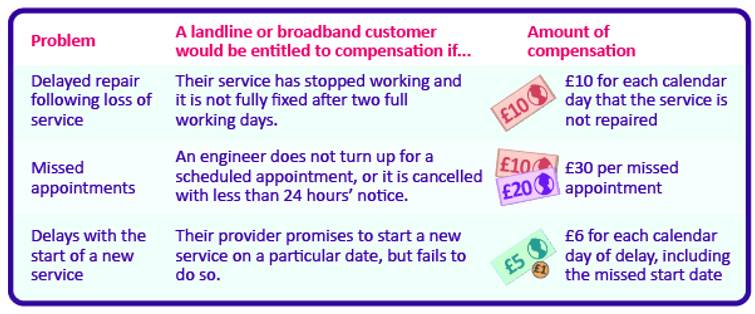ISPs try to block £185m broadband compensation
Customers seeking compensation for poor broadband service could soon have a much easier way to make a claim, but shouldn’t expect a big payout if ISPs have their way.
A report co-signed by some of the UK’s largest ISPs including BT, Sky and Virgin Media, suggests the introduction of a voluntary system for automatic compensation.
Delays for installation, repairs or appointments missed or cancelled with less than 24 hours’ notice could be eligible for compensation.
The proposals are a watered down version of Ofcom’s own idea for a £185 million fund to reimburse customers on the receiving end of shoddy service.
Ofcom want automatic compensation
At the moment compensation only goes to around 15% of those who make complaints about their broadband, with payments of £16m reaching customers.
Ofcom’s plan would scale up this compensation 10 times over.
It suggests £10 a day if your landline or broadband goes down and it’s not fixed on time, or £30 compensation every time an engineer misses an appointment to install your broadband.
It could mean an end to endless days off work while you wait for a broadband engineer who never appears.

ISP plan would cut £52m
But ISPs are pushing back against the idea as they believe it to be too generous to customers.
They want to scale back these payments by around a third.
Research from Citizens’ Advice suggests customers could potentially lose out on £52 million – 32% less than Ofcom’s proposals – if telecoms industry plans go ahead.
The report, which is subtitled Protecting customers from quality of service problems, suggests offering customers up to £10 less per missed appointment than Ofcom’s proposed minimum payment.
Under the current system, broadband companies sometimes offer compensation, but only 15% of claims are successful and there is no existing price structure for payments.
The regulator’s plans, however, offer a £30 rebate if an engineer fails to turn up for a scheduled appointment or £10 for every day your broadband goes down and isn’t fixed.
Utilities companies like gas and electricity suppliers already offer similar compensation schemes which see customers’ bills automatically reduced when something goes wrong with the service.
BT’s report does acknowledge the inconvenience and frustration caused by engineer delays and loss of service, but would offer customers substantially less than under Ofcom’s plans.
The report also accuses Ofcom of ‘distorting’ competition among broadband suppliers by calling for higher rates of compensation.
BT say minimum payouts should be smaller, even at the risk “consumer welfare loss”.
When surveyed by Ofcom, two fifths of customers say loss of service had a negative effect on them, and 30% of respondents said it caused stress or anxiety.
Ofcom receives 5.7 million complaints a year from customers experiencing problems with their broadband.
Other suppliers, such as EE and Plusnet are also connected to the report, although TalkTalk is notably absent.
BT recently accused TalkTalk of blocking plans for compensation, by refusing to enter into a voluntary code of practice.
Mobile broadband customers shouldn’t get their hopes up.
Both BT and Ofcom say there is “no justification” for a similar automatic compensation scheme for mobile broadband.
Ofcom’s consultation on broadband compensation opened on 5 July 2017 and is expected to produce a ruling by the end of the year.






